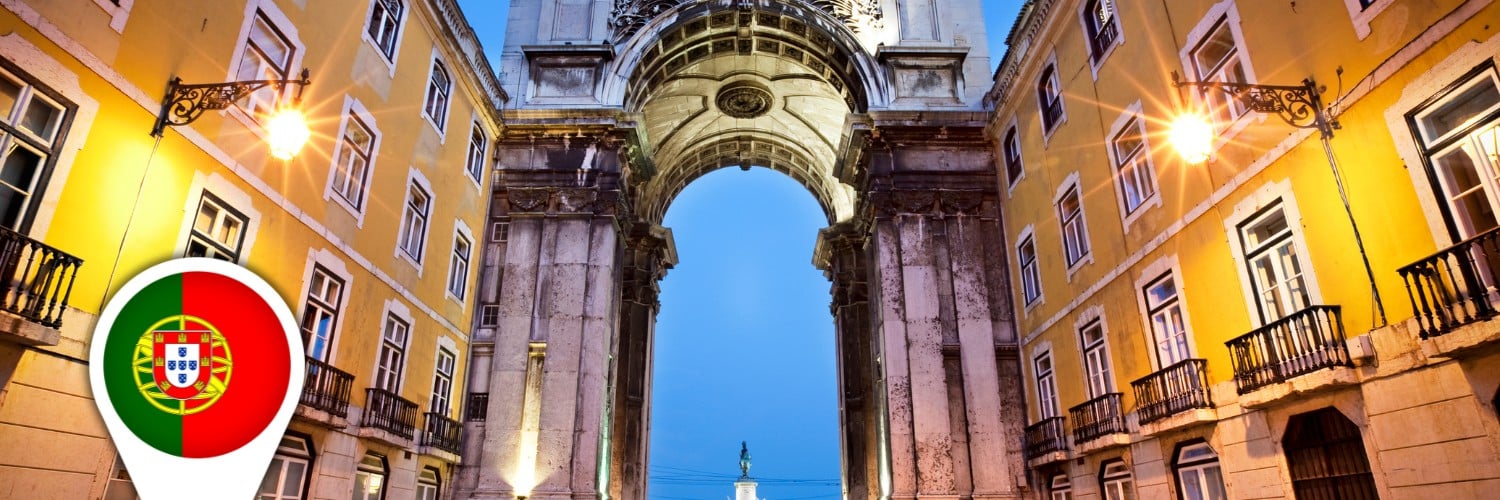The Ultimate Guide of Portugal for US Citizens
Portugal for US Citizens
Portugal, nestled on the southwestern edge of Europe, is a country rich in history, culture, and natural beauty. Known for its warm Mediterranean climate, picturesque landscapes, and the charm of its historic cities, Portugal offers a compelling destination for US citizens interested in travel, relocation, or investment. Access to the many other member countries of the European Union is another big plus.
Recommended Pages:
- Cost of Living in Portugal
- Healthcare in Portugal
- Portugal’s Housing Market
- Portugal Education System
- Employment Opportunities in Portugal
- Portugal’s Safety and Security
- Opening a Bank Account in Portugal
- Entertainment and Leisure Activities in Portugal
- Retirement in Portugal as a US Citizen
- Tax Implications for US Expats
- Cultural Adaptation of US Citizens in Portugal
- Networking and US Expat Communities
- Portugal Public Transportation
- The Portuguese Banking System
Why Portugal?
Portugal has become increasingly popular among Americans due to its relaxed lifestyle, cost-effective living, and friendly locals. The country’s diverse regions offer something for everyone—from the bustling streets of Lisbon and Porto to the serene beaches of the Algarve and the lush, green landscapes of the Azores and Madeira.
Cultural and Historical Connection:
The relationship between the United States and Portugal is built on a foundation of strong historical and cultural ties. These connections make Portugal a welcoming destination for Americans, who often find the country’s traditions and cultural heritage both familiar and fascinating.
Opportunities in Portugal:
For those looking to make more than a tourist visit, Portugal offers favorable conditions for expatriates, including a straightforward residency visa process, attractive real estate investment options, and a beneficial tax regime for newcomers. The Non-Habitual Resident (NHR) tax status, for instance, provides significant financial advantages for qualifying expats, making Portugal an attractive country for retirement and long-term investment.
In this guide, we will explore various aspects of Portuguese life that are of interest to US citizens—from the logistics of moving and living in Portugal to enjoying its rich cultural tapestry and navigating its systems like healthcare and education. Whether you’re considering a short visit or a permanent move, understanding what Portugal has to offer will help you make the most of your experience.
Top 7 Reasons Why US Citizens Choose Portugal

-
Affordable Cost of Living: Portugal offers a lower cost of living compared to many parts of the US, which includes affordable housing, food, and general expenses.
-
Pleasant Climate: The country enjoys a mild Mediterranean climate, making it attractive for those seeking year-round pleasant weather.
- High Quality of Life: Portugal ranks high in global quality of life indexes, thanks to its relaxed lifestyle, safety, and public services.
-
Beautiful Landscapes and Beaches: From the Algarve’s stunning coastlines to the Douro Valley’s lush vineyards, Portugal offers diverse and beautiful scenery.
-
Safety: Portugal is consistently ranked as one of the safest countries in the world.
-
Accessible Healthcare: Portugal has a high standard of affordable healthcare accessible to residents, including expats who are registered.
-
English-Friendly Environment: While Portuguese is the primary language, English is widely spoken, especially in business and tourist areas.
Bonus Reason!
Friendly and Welcoming Culture: Portuguese people are known for being warm and friendly, which makes the transition for expats much easier.
Traveling to Portugal

Entry Requirements for US Citizens:
Traveling to Portugal is convenient for US citizens, as they can enter visa-free for tourism or business stays of up to 90 days within a 180-day period. For those planning longer stays, various visas are available depending on the purpose of the visit, such as the D7 Passive Income Visa for retirees, the Golden Visa for investors, or the D2 Visa for entrepreneurs.
Best Times to Visit:
Portugal’s climate varies significantly from one region to another. The best time to visit largely depends on your preferred activities and location. The spring (March to May) and fall (September to November) seasons are generally ideal for visiting most parts of the country, offering mild temperatures and fewer crowds. Summers are perfect for beach holidays, particularly in coastal areas like the Algarve, where the weather is sunny and warm.
Major Tourist Attractions:
- Lisbon: Explore the historic neighborhoods of Alfama and Belém, and don’t miss the iconic Tram 28 ride.
- Porto: Famous for its riverside district, Ribeira, and its port wine cellars.
- The Algarve: Known for its stunning beaches, cliffside views, and golf resorts.
- Sintra: Home to colorful palaces and majestic castles set in lush forests.
- The Douro Valley: Renowned for its scenic vineyard terraces and wine tours.
- Madeira and Azores: These island groups offer spectacular landscapes, from volcanic craters and lush gardens to whale watching.
Each of these destinations showcases Portugal’s rich history and natural beauty, making it a diverse and appealing country for all types of travelers.
Living in Portugal

Overview of the Expat Community: Portugal’s expat community is thriving, with a significant presence of US citizens, especially in larger cities such as Lisbon and Porto, as well as in expat havens like the Algarve. These communities offer a supportive network for newcomers, helping them adjust to life in Portugal through social gatherings, cultural integration programs, and language exchange meetups.
Cost of Living Comparison with the US: The cost of living in Portugal is generally lower than in many if not most parts of the United States. Housing, groceries, and transportation are particularly more affordable, which can significantly enhance the quality of life for expats. For instance, renting an apartment in premium areas such as central Lisbon or Porto will be less expensive than in major US cities like New York or San Francisco.
Lifestyle and Cultural Differences: Portugal offers a relaxed pace of life with a strong emphasis on family and leisure, which can be a pleasant change for those accustomed to the fast-paced American lifestyle. The Portuguese are known for their hospitality and friendly nature, making it easier for expats to feel at home.
Social Customs and Integration: Engaging with the local culture through cuisine, festivals, and public celebrations is a rewarding aspect of living in Portugal. Learning some basic Portuguese can significantly aid in integration, as it opens up more authentic interactions with locals and demonstrates respect for the local culture.
Real Estate in Portugal

Buying Property in Portugal for US Citizens: Purchasing property in Portugal offers a straightforward path for US citizens looking to invest, retire, or live in the country. The process is reasonably well-regulated, with necessary checks and legal procedures to ensure a smooth transaction. Foreign buyers need a Portuguese Fiscal Number (NIF) and should work with a reputable local real estate agent and a lawyer. The typical steps include finding a property, signing a promissory contract, paying a deposit, and finally completing the transaction at a notary office.
Popular Regions for Expats and Property Investment Opportunities:
- Lisbon: The capital city is popular for its vibrant lifestyle, cultural offerings, and as a hub for startups and businesses.
- Porto: Known for its historical significance, beautiful architecture, and increasingly, a thriving tech scene.
- The Algarve: Favored by retirees and vacationers for its stunning beaches, golf courses, and mild climate.
- Silver Coast: Offers a quieter alternative to the Algarve with equally beautiful landscapes and lower property prices.
Legal Considerations and Process of Buying Property: When buying property in Portugal, it is crucial to conduct thorough due diligence. This includes checking the legal status of the property with the Land Registry (Conservatória do Registo Predial), ensuring there are no outstanding debts, and that the property’s use is legally compliant with local planning laws. It is also advisable to understand the tax implications, including property transfer taxes (IMT) and annual property taxes (IMI).
Benefits of Owning Property in Portugal: Owning property in Portugal not only provides a home in one of Europe’s most scenic countries but can also qualify the owner for a residence visa under the Golden Visa program, depending on the investment amount. Additionally, property owners benefit from Portugal’s stable real estate market, which has seen consistent growth, especially in prime areas.
Working and Doing Business in Portugal

Business Environment for Expatriates: Portugal presents a favorable business environment for expatriates, including US citizens. It is characterized by a supportive startup ecosystem, especially in cities like Lisbon and Porto, which are becoming known as hubs for innovation and technology. The government offers various incentives for entrepreneurship, such as tax breaks and investment grants, particularly for tech and green energy sectors.
Work Visas and Permits for US Citizens: To work in Portugal, US citizens must obtain the appropriate work visa or residence permit. The most common types include the D2 Visa for entrepreneurs who intend to establish a business in Portugal, and the D3 Visa for highly qualified activities performed for Portuguese companies. The process involves submitting proof of employment or business intentions, financial means, and accommodation.
Starting a Business as a Foreign National: Starting a business in Portugal is a viable option for many expats due to the relatively low startup costs and straightforward registration process. Key steps include:
- Obtaining a Portuguese tax number (NIF).
- Registering the business with the Portuguese Commercial Registry.
- Applying for the necessary permits and licenses, depending on the business type.
Challenges and Considerations: While the prospect of working or starting a business in Portugal is attractive, expats may face challenges such as navigating local bureaucracy and understanding different tax laws. Additionally, the Portuguese market is smaller compared to other EU countries, which may limit growth potential for certain types of businesses that rely on local buyers.
Support and Resources: The Portuguese government and various private organizations offer support to new businesses through consultancy services, networking events, and incubation programs. Resources such as the IAPMEI (Portuguese Agency for Competitiveness and Innovation) provide guidance and financial support to startups.
Healthcare System in Portugal

Portuguese Healthcare System: Portugal’s healthcare system is renowned for its high standard of care and is ranked highly on a global scale. The system is predominantly public, funded through general taxation. All residents in Portugal, including expatriates with residency status, have access to healthcare services provided by the National Health Service (Serviço Nacional de Saúde, SNS). This includes everything from routine check-ups and emergency services to long-term medical treatments and preventive care.
Access for US Expats: US citizens living in Portugal can access the public healthcare system once they are registered as residents and contribute to the social security system. Registering for healthcare involves obtaining a user number (Número de Utente) from the local health center. This registration grants access to public healthcare services at the same cost as Portuguese citizens, which is usually surprisingly low to US citizens who are used to the high costs of health insurance and health services back home.
Private Healthcare Options: In addition to the public system, there is a robust private healthcare sector in Portugal, which many expats choose to use for shorter waiting times and a broader range of private specialists. Private health insurance is widely available and can be more comfortable for English-speaking expats, offering services and support in English.
Health Insurance Requirements: For US citizens moving to Portugal, particularly under visas like the D7 or Golden Visa, having comprehensive health insurance is a requirement. Initially, this may need to be sourced from a private provider until eligibility for the public system is established.
Pharmacies and Medications: Pharmacies are readily available across Portugal and are well-stocked with both prescription and over-the-counter medications. Pharmacists in Portugal are highly qualified and can offer advice on minor health issues and the appropriate medication.
Quality of Care: The quality of healthcare in Portugal is generally high, with well-trained medical staff and modern facilities, especially in larger urban areas. The World Health Organization ranks Portugal’s healthcare system as better than average, which can be particularly reassuring for retirees and those with chronic health conditions.
Retirement in Portugal

Benefits of Retiring in Portugal for US Citizens: Portugal is increasingly popular among US retirees due to its mild climate, relatively low cost of living, and high quality of life. The country offers a safe environment, rich cultural heritage, and friendly communities that welcome expatriates.
The D7 Visa – A Pathway for Retirees: The D7 Visa, also known as the Passive Income Visa, is particularly suited for retirees. It requires proof of a stable passive income, such as pensions, sufficient to support living expenses in Portugal. This visa not only allows retirees to reside in Portugal but also grants them access to the public healthcare system and other social benefits.
Daily Life and Community Integration: Retirees can enjoy a relaxed lifestyle, with plenty of opportunities to engage in leisure activities such as golf, sailing, hiking, and exploring the country’s historical sites. Portugal’s towns and cities host vibrant expat communities that organize regular social events, helping newcomers to integrate and form new friendships.
Access to Healthcare: Healthcare is a crucial consideration, and Portugal excels in this area with both public and private healthcare systems that offer high-quality services. Retirees can access these services at a lower cost compared to the US, and the coverage is comprehensive, ensuring peace of mind.
Financial Incentives: Portugal offers attractive financial incentives for retirees, including the Non-Habitual Resident (NHR) tax regime, which provides tax efficiencies on foreign income (including pensions) for up to ten years. This can significantly reduce the tax burden for US retirees.
Taxation and Financial Planning for US Expats in Portugal

Portuguese Tax System: Portugal’s tax system may differ significantly from that of the US. For US citizens living in Portugal, it’s crucial to understand the dual tax obligations. While Portugal taxes residents on worldwide income, the US also requires its citizens to file taxes regardless of their place of residence. This can lead to the need of tax planning, but there are measures like the Foreign Earned Income Exclusion and tax treaties to prevent double taxation.
Non-Habitual Resident (NHR) Tax Regime: The Non-Habitual Resident program was one of the most attractive financial incentives for US expats in Portugal. This regime offers reduced tax rates or exemptions on certain types of foreign income (including pensions, dividends, royalties, and interest) for a period of ten years. It’s particularly beneficial for retirees and professionals with income from outside Portugal, providing substantial tax savings. Unfortunately, this program is currently unavailable for new applicants.
Financial Planning for Expats: Effective financial planning is essential for US expats in Portugal to ensure that all fiscal obligations are met, and financial goals are achieved. This includes managing retirement accounts, investments, estate planning, and understanding the implications of major financial decisions in the context of Portuguese law.
Banking and Managing Finances: Setting up a local bank account is one of the first steps upon moving to Portugal. This facilitates easier management of daily finances, payment of bills, and receipt of any income like pensions or local employment earnings. It’s also wise to understand how to transfer money between the US and Portugal efficiently and cost-effectively, considering factors like exchange rates and transaction fees.
Estate Planning and Inheritance Laws: Estate planning in Portugal can differ from the US, especially concerning inheritance laws, which may automatically allocate portions of an estate to certain family members, unlike in the US where wills can freely distribute assets. Understanding these differences is crucial to ensure that your estate is managed as per your wishes after your passing.
Proper planning and professional advice are recommended to make the most of the financial opportunities available in Portugal.
Cultural Insights and Tips for Integration in Portugal

Understanding Portuguese Culture: Embracing the local culture is key to a successful integration in Portugal. Portuguese culture places a high value on relationships, family, and social connections. Expats should take the time to engage in local traditions and social activities, which often revolve around meals, festivals, and family gatherings. Participating in these can greatly enhance one’s understanding and appreciation of the local way of life.
Language as a Gateway to Integration: While many Portuguese speak English, particularly in business and tourist areas, learning Portuguese is invaluable for deeper integration into the community. Language courses are widely available, including community classes, which also offer opportunities to meet locals and other expats. Even basic proficiency can open doors, making everyday interactions more meaningful and easier.
Navigating Bureaucracy: Portugal is known for its bureaucratic processes, which can sometimes be slow and cumbersome. Understanding local administrative procedures is essential. Patience and persistence are often required, especially when dealing with government departments for residency, health care, and other official matters. Hiring a local advisor or legal help can streamline this process.
Building Social Connections: Joining expat communities, local clubs, or interest-based groups can help new arrivals build a network and find friends with common interests. Websites and social media platforms offer resources and event listings that can help in finding local expat communities.
Cultural Etiquette: Portuguese people are generally formal in their social relations. Politeness and respect are highly valued, and greetings often involve a handshake or, among acquaintances, cheek kissing. It is common to say ‘hello’ and ‘thank you’ in the local language during interactions, which shows respect and an effort to integrate.
Adapting to the Portuguese Lifestyle: The Portuguese lifestyle is often relaxed and leisurely, especially compared to the fast pace of American cities. Shops may close for lunch, and dinners often start later than in the US. Embracing this slower pace of life can lead to a more enjoyable experience living in Portugal.
Like what you saw? Check our many other pages about Portugal for a more in-depth understanding of this unique country!


